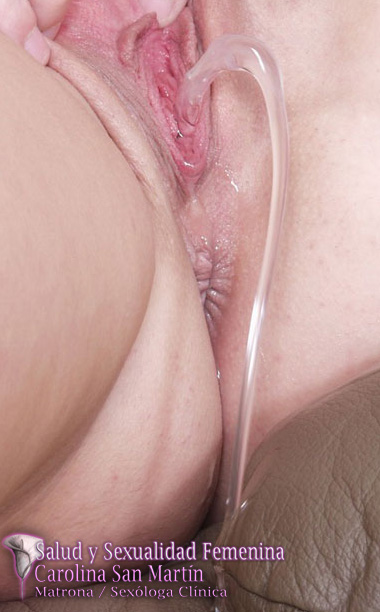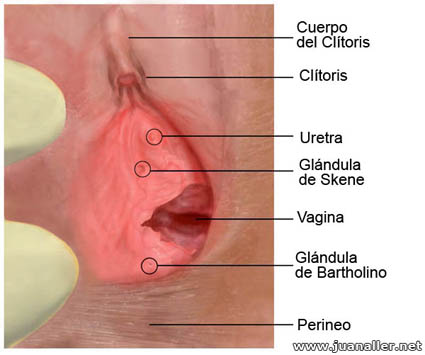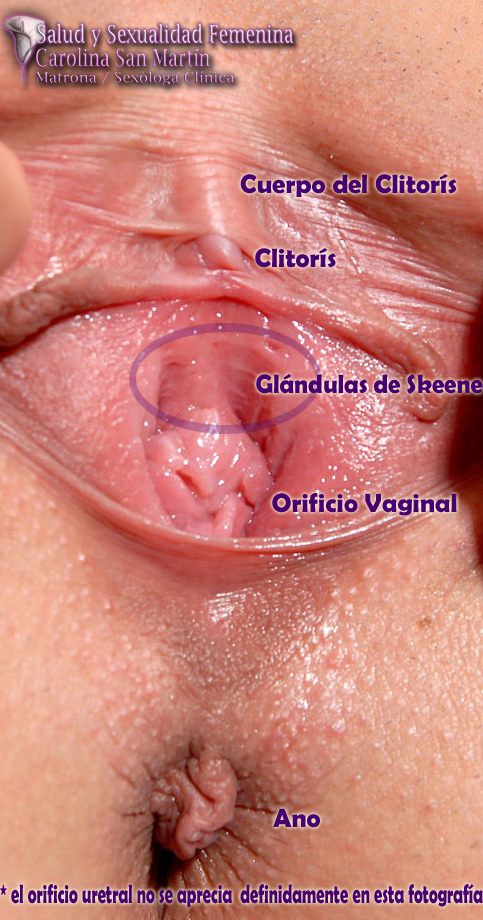One of the most surprising discoveries in recent years was the rediscovery of the G-spot. With it came a yet more revolutionary concept: the presence of genuine female ejaculation. It is well known that women produce a vaginal secretion at the moment of excitement, which aims to lubricate the vaginal walls so that penetration does not result in pain. Initially, it was believed that many patients' reports of expelling a abundant liquid during sexual relations referred to this vaginal lubrication. However, several researchers studied the phenomenon thoroughly and concluded that in some women, besides vaginal lubrication, a liquid is released through the urethra or urine channel during sexual relations. This liquid is not urine. Physically and chemically, it differs from urinary characteristics and its release through the urethra rules out the initial possibility that it was simply vaginal lubrication. Female ejaculation occurs just when orgasm happens, especially in women familiar with G-spot stimulation techniques (to be discussed in a future article). This information is very useful clinically, as some women believe they urinate during sexual relations and this causes strong inhibitions in their sexual performance. On the other hand, several patients have been operated on for urinary incontinence because both the doctor and patient believed it was a case of urinary incontinence. We know it's not urinary incontinence because it occurs even when the woman has urinated before sexual relations. Additionally, unlike classic urinary incontinence, this liquid release only occurs during sexual activity and not with physical efforts. At a lived level, couples assume it's not urine basically because this secretion does not smell like urine, and even if it's abundant and soaks the bed sheets, it doesn't come with that unique urinal odor.
It is well known that women produce a vaginal secretion at the moment of excitement, which aims to lubricate the vaginal walls so that penetration does not result in pain. Initially, it was believed that many patients' reports of expelling a abundant liquid during sexual relations referred to this vaginal lubrication. However, several researchers studied the phenomenon thoroughly and concluded that in some women, besides vaginal lubrication, a liquid is released through the urethra or urine channel during sexual relations. This liquid is not urine. Physically and chemically, it differs from urinary characteristics and its release through the urethra rules out the initial possibility that it was simply vaginal lubrication. Female ejaculation occurs just when orgasm happens, especially in women familiar with G-spot stimulation techniques (to be discussed in a future article). This information is very useful clinically, as some women believe they urinate during sexual relations and this causes strong inhibitions in their sexual performance. On the other hand, several patients have been operated on for urinary incontinence because both the doctor and patient believed it was a case of urinary incontinence. We know it's not urinary incontinence because it occurs even when the woman has urinated before sexual relations. Additionally, unlike classic urinary incontinence, this liquid release only occurs during sexual activity and not with physical efforts. At a lived level, couples assume it's not urine basically because this secretion does not smell like urine, and even if it's abundant and soaks the bed sheets, it doesn't come with that unique urinal odor. From a medical point of view, the diagnosis is relatively simple. The couple is asked to collect a sample of the liquid and analyze it microscopically to differentiate it from urine.
From a medical point of view, the diagnosis is relatively simple. The couple is asked to collect a sample of the liquid and analyze it microscopically to differentiate it from urine.
It must be clear: Not all women present with female ejaculation, and in several cases, it's a problem with urine retention.
What is certain is that a considerable group of women experience this phenomenon, which is seen by both members of the couple as a delight in the world of sexual pleasures.
_______
Many women experience the discharge of this liquid during sex. When you're well-stimulated, you achieve excitement and it's more likely to reach orgasm, which causes the rhythmic contractions of the pelvic muscles, which produce this abundant vaginal secretion, also known as female ejaculation. This abundant vaginal secretion is normal in women who have it and not all women are capable of secreting it abundantly enough to be noticed. The more clitorial and vaginal stimulation you have, the greater will be the flow that you secrete, or just liquid that drips nothing more. Not all women present with female ejaculation, but most experience some degree of expulsion of this secretion, although it may be almost imperceptible or absorbed into the body in many cases. As it comes from the paraurethral glands or Skene's glands and is expelled through the urethra, many women mistakenly think it's urine escaping due to incontinence during sexual intercourse, which causes them great inhibition in sexual relations.
Not all women present with female ejaculation, but most experience some degree of expulsion of this secretion, although it may be almost imperceptible or absorbed into the body in many cases. As it comes from the paraurethral glands or Skene's glands and is expelled through the urethra, many women mistakenly think it's urine escaping due to incontinence during sexual intercourse, which causes them great inhibition in sexual relations. As it comes out just when the orgasm occurs, this vaginal fluid is also different from that generated at the moment of female sexual excitement and has the goal of lubricating you to facilitate penetration. It's still not known why female ejaculation occurs if the woman no longer needs it for lubrication.
As it comes out just when the orgasm occurs, this vaginal fluid is also different from that generated at the moment of female sexual excitement and has the goal of lubricating you to facilitate penetration. It's still not known why female ejaculation occurs if the woman no longer needs it for lubrication. Therefore, the recommendation is to stop obsessing over not getting your sheets wet during sex. Far from being uncomfortable or an obstacle to your sexual pleasure, enjoy your excess moisture and feel it as another delight in the enormous world of sexual pleasures.
Therefore, the recommendation is to stop obsessing over not getting your sheets wet during sex. Far from being uncomfortable or an obstacle to your sexual pleasure, enjoy your excess moisture and feel it as another delight in the enormous world of sexual pleasures.
 What are the Skene glands and where are they located? If we count the openings that are present, we will observe that: above the vaginal entrance is located the urethral opening, which is where women urinate, a little lower down are the Skene glands, one on each side of the vaginal entrance. Behind these openings is the discharge of the Skene gland ducts. They discharge into the female urethra walls through openings and lakes in the inner layer of the urethra.
What are the Skene glands and where are they located? If we count the openings that are present, we will observe that: above the vaginal entrance is located the urethral opening, which is where women urinate, a little lower down are the Skene glands, one on each side of the vaginal entrance. Behind these openings is the discharge of the Skene gland ducts. They discharge into the female urethra walls through openings and lakes in the inner layer of the urethra.
There are two more openings below that are the Bartolino glands.
By the way, since the Skene glands are located on the anterior wall of the vagina, around the external opening of the urethra, they are intimately linked to the area where the so-called G-spot is focused.
These glands are also recognized by some authors as urethral glands, paraurethral glands, minor vestibular glands, point U and female prostate.
What do they have to do with feminine sexuality?
In reality, they form an important part of the feminine sexual response, since these glands are responsible for producing and expelling a liquid. It is during female sexual excitement that the Skene glands produce and fill up with a liquid that will be expelled later in the orgasmic phase.
It's not urine as many people tend to think, but rather an alkaline liquid secreted by the Skene glands, composed of creatinine, an enzyme called acid phosphatase prosthetic FAP, PSA protein, glucose, and fructose. These substances have been found in female ejaculation content. The amount of liquid varies from just a few drops to half a liter, and it is also proportional to the duration of the woman's orgasm. And this relationship between orgasm and ejaculation is what makes it look extraordinary.
This liquid usually is expelled without the need to reach orgasm, especially when the glands overflow with fluid and as a result they let it flow slowly. It's something very similar to what happens in the body of men, the production of mucus and sperm continues producing a nocturnal discharge, when this has not had any sexual activity for a period of time.
Is this something new?
As part of the scientific validations of our latest times, it could seem so, but what most people don't know is that: It's Greek doctor Hippocrates who in the 4th century BC described a substance called female semen. Another data point, it was in 1672 when Regnier de Graaf proposed the existence of a female prostate. And finally, the name of these glands are due to the discovery and description made for the first time by Scottish gynecologist Alexander Skene, this was in the 19th century.
Does this mean that orgasm and ejaculation are not only two distinct phases, but also intimately linked?
The sexual response is divided into 6 stages: excitement, plateau, orgasm, ejaculation, resolution, and refractory period. But each of these stages are intimately linked with each other, and many times it's so subtle that the individual doesn't notice the differences between one and another, especially when we're talking about the stages of orgasm and ejaculation. Through the years in my professional experience, I have found that most women who experience a full sexual life and who have also experienced intense orgasms are those who manifest regularity with ejaculation. But there are also women who manifest ejaculation without the presence of deep orgasms.
We know beforehand that for human beings, the concepts that were poured into their formative stages are determining. Thus, I can tell you that the elements relevant factors that allow or do not allow a woman to reach her orgasm, have to do with guidelines, ideas, permissions and information regarding sexuality. What is your recommendation? Basic knowledge of each part that forms the human body will enable the individual to clearly understand for what they are designed and what they will contribute within sexual response, Skene glands are designed to produce female ejaculation and this in turn allows the woman to experience deep sensations of pleasure. But another important circumstance is that this process frees the woman from the negative load that has been made her believe for centuries. The woman is capable of feeling and experiencing sexual desire and deep pleasurable resolutions without shame and ancient moral prejudices.
 It is well known that women produce a vaginal secretion at the moment of excitement, which aims to lubricate the vaginal walls so that penetration does not result in pain. Initially, it was believed that many patients' reports of expelling a abundant liquid during sexual relations referred to this vaginal lubrication. However, several researchers studied the phenomenon thoroughly and concluded that in some women, besides vaginal lubrication, a liquid is released through the urethra or urine channel during sexual relations. This liquid is not urine. Physically and chemically, it differs from urinary characteristics and its release through the urethra rules out the initial possibility that it was simply vaginal lubrication. Female ejaculation occurs just when orgasm happens, especially in women familiar with G-spot stimulation techniques (to be discussed in a future article). This information is very useful clinically, as some women believe they urinate during sexual relations and this causes strong inhibitions in their sexual performance. On the other hand, several patients have been operated on for urinary incontinence because both the doctor and patient believed it was a case of urinary incontinence. We know it's not urinary incontinence because it occurs even when the woman has urinated before sexual relations. Additionally, unlike classic urinary incontinence, this liquid release only occurs during sexual activity and not with physical efforts. At a lived level, couples assume it's not urine basically because this secretion does not smell like urine, and even if it's abundant and soaks the bed sheets, it doesn't come with that unique urinal odor.
It is well known that women produce a vaginal secretion at the moment of excitement, which aims to lubricate the vaginal walls so that penetration does not result in pain. Initially, it was believed that many patients' reports of expelling a abundant liquid during sexual relations referred to this vaginal lubrication. However, several researchers studied the phenomenon thoroughly and concluded that in some women, besides vaginal lubrication, a liquid is released through the urethra or urine channel during sexual relations. This liquid is not urine. Physically and chemically, it differs from urinary characteristics and its release through the urethra rules out the initial possibility that it was simply vaginal lubrication. Female ejaculation occurs just when orgasm happens, especially in women familiar with G-spot stimulation techniques (to be discussed in a future article). This information is very useful clinically, as some women believe they urinate during sexual relations and this causes strong inhibitions in their sexual performance. On the other hand, several patients have been operated on for urinary incontinence because both the doctor and patient believed it was a case of urinary incontinence. We know it's not urinary incontinence because it occurs even when the woman has urinated before sexual relations. Additionally, unlike classic urinary incontinence, this liquid release only occurs during sexual activity and not with physical efforts. At a lived level, couples assume it's not urine basically because this secretion does not smell like urine, and even if it's abundant and soaks the bed sheets, it doesn't come with that unique urinal odor. From a medical point of view, the diagnosis is relatively simple. The couple is asked to collect a sample of the liquid and analyze it microscopically to differentiate it from urine.
From a medical point of view, the diagnosis is relatively simple. The couple is asked to collect a sample of the liquid and analyze it microscopically to differentiate it from urine.It must be clear: Not all women present with female ejaculation, and in several cases, it's a problem with urine retention.
What is certain is that a considerable group of women experience this phenomenon, which is seen by both members of the couple as a delight in the world of sexual pleasures.
_______
Many women experience the discharge of this liquid during sex. When you're well-stimulated, you achieve excitement and it's more likely to reach orgasm, which causes the rhythmic contractions of the pelvic muscles, which produce this abundant vaginal secretion, also known as female ejaculation. This abundant vaginal secretion is normal in women who have it and not all women are capable of secreting it abundantly enough to be noticed. The more clitorial and vaginal stimulation you have, the greater will be the flow that you secrete, or just liquid that drips nothing more.
 Not all women present with female ejaculation, but most experience some degree of expulsion of this secretion, although it may be almost imperceptible or absorbed into the body in many cases. As it comes from the paraurethral glands or Skene's glands and is expelled through the urethra, many women mistakenly think it's urine escaping due to incontinence during sexual intercourse, which causes them great inhibition in sexual relations.
Not all women present with female ejaculation, but most experience some degree of expulsion of this secretion, although it may be almost imperceptible or absorbed into the body in many cases. As it comes from the paraurethral glands or Skene's glands and is expelled through the urethra, many women mistakenly think it's urine escaping due to incontinence during sexual intercourse, which causes them great inhibition in sexual relations. As it comes out just when the orgasm occurs, this vaginal fluid is also different from that generated at the moment of female sexual excitement and has the goal of lubricating you to facilitate penetration. It's still not known why female ejaculation occurs if the woman no longer needs it for lubrication.
As it comes out just when the orgasm occurs, this vaginal fluid is also different from that generated at the moment of female sexual excitement and has the goal of lubricating you to facilitate penetration. It's still not known why female ejaculation occurs if the woman no longer needs it for lubrication. Therefore, the recommendation is to stop obsessing over not getting your sheets wet during sex. Far from being uncomfortable or an obstacle to your sexual pleasure, enjoy your excess moisture and feel it as another delight in the enormous world of sexual pleasures.
Therefore, the recommendation is to stop obsessing over not getting your sheets wet during sex. Far from being uncomfortable or an obstacle to your sexual pleasure, enjoy your excess moisture and feel it as another delight in the enormous world of sexual pleasures.
 What are the Skene glands and where are they located? If we count the openings that are present, we will observe that: above the vaginal entrance is located the urethral opening, which is where women urinate, a little lower down are the Skene glands, one on each side of the vaginal entrance. Behind these openings is the discharge of the Skene gland ducts. They discharge into the female urethra walls through openings and lakes in the inner layer of the urethra.
What are the Skene glands and where are they located? If we count the openings that are present, we will observe that: above the vaginal entrance is located the urethral opening, which is where women urinate, a little lower down are the Skene glands, one on each side of the vaginal entrance. Behind these openings is the discharge of the Skene gland ducts. They discharge into the female urethra walls through openings and lakes in the inner layer of the urethra.There are two more openings below that are the Bartolino glands.
By the way, since the Skene glands are located on the anterior wall of the vagina, around the external opening of the urethra, they are intimately linked to the area where the so-called G-spot is focused.
These glands are also recognized by some authors as urethral glands, paraurethral glands, minor vestibular glands, point U and female prostate.
What do they have to do with feminine sexuality?
In reality, they form an important part of the feminine sexual response, since these glands are responsible for producing and expelling a liquid. It is during female sexual excitement that the Skene glands produce and fill up with a liquid that will be expelled later in the orgasmic phase.
It's not urine as many people tend to think, but rather an alkaline liquid secreted by the Skene glands, composed of creatinine, an enzyme called acid phosphatase prosthetic FAP, PSA protein, glucose, and fructose. These substances have been found in female ejaculation content. The amount of liquid varies from just a few drops to half a liter, and it is also proportional to the duration of the woman's orgasm. And this relationship between orgasm and ejaculation is what makes it look extraordinary.
This liquid usually is expelled without the need to reach orgasm, especially when the glands overflow with fluid and as a result they let it flow slowly. It's something very similar to what happens in the body of men, the production of mucus and sperm continues producing a nocturnal discharge, when this has not had any sexual activity for a period of time.
Is this something new?
As part of the scientific validations of our latest times, it could seem so, but what most people don't know is that: It's Greek doctor Hippocrates who in the 4th century BC described a substance called female semen. Another data point, it was in 1672 when Regnier de Graaf proposed the existence of a female prostate. And finally, the name of these glands are due to the discovery and description made for the first time by Scottish gynecologist Alexander Skene, this was in the 19th century.
Does this mean that orgasm and ejaculation are not only two distinct phases, but also intimately linked?
The sexual response is divided into 6 stages: excitement, plateau, orgasm, ejaculation, resolution, and refractory period. But each of these stages are intimately linked with each other, and many times it's so subtle that the individual doesn't notice the differences between one and another, especially when we're talking about the stages of orgasm and ejaculation. Through the years in my professional experience, I have found that most women who experience a full sexual life and who have also experienced intense orgasms are those who manifest regularity with ejaculation. But there are also women who manifest ejaculation without the presence of deep orgasms.
We know beforehand that for human beings, the concepts that were poured into their formative stages are determining. Thus, I can tell you that the elements relevant factors that allow or do not allow a woman to reach her orgasm, have to do with guidelines, ideas, permissions and information regarding sexuality. What is your recommendation? Basic knowledge of each part that forms the human body will enable the individual to clearly understand for what they are designed and what they will contribute within sexual response, Skene glands are designed to produce female ejaculation and this in turn allows the woman to experience deep sensations of pleasure. But another important circumstance is that this process frees the woman from the negative load that has been made her believe for centuries. The woman is capable of feeling and experiencing sexual desire and deep pleasurable resolutions without shame and ancient moral prejudices.
4 comentários - Eyaculacion Femenina